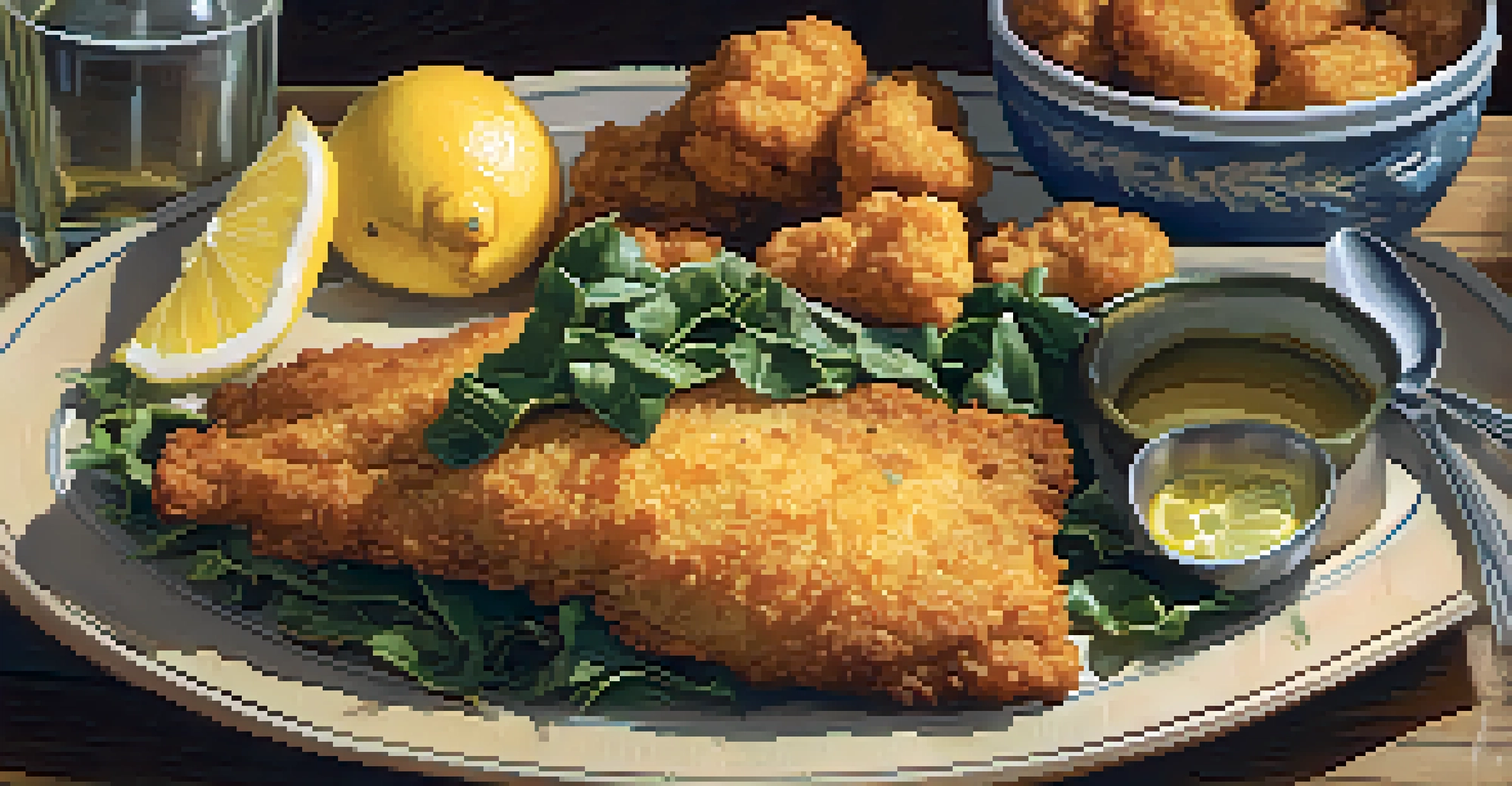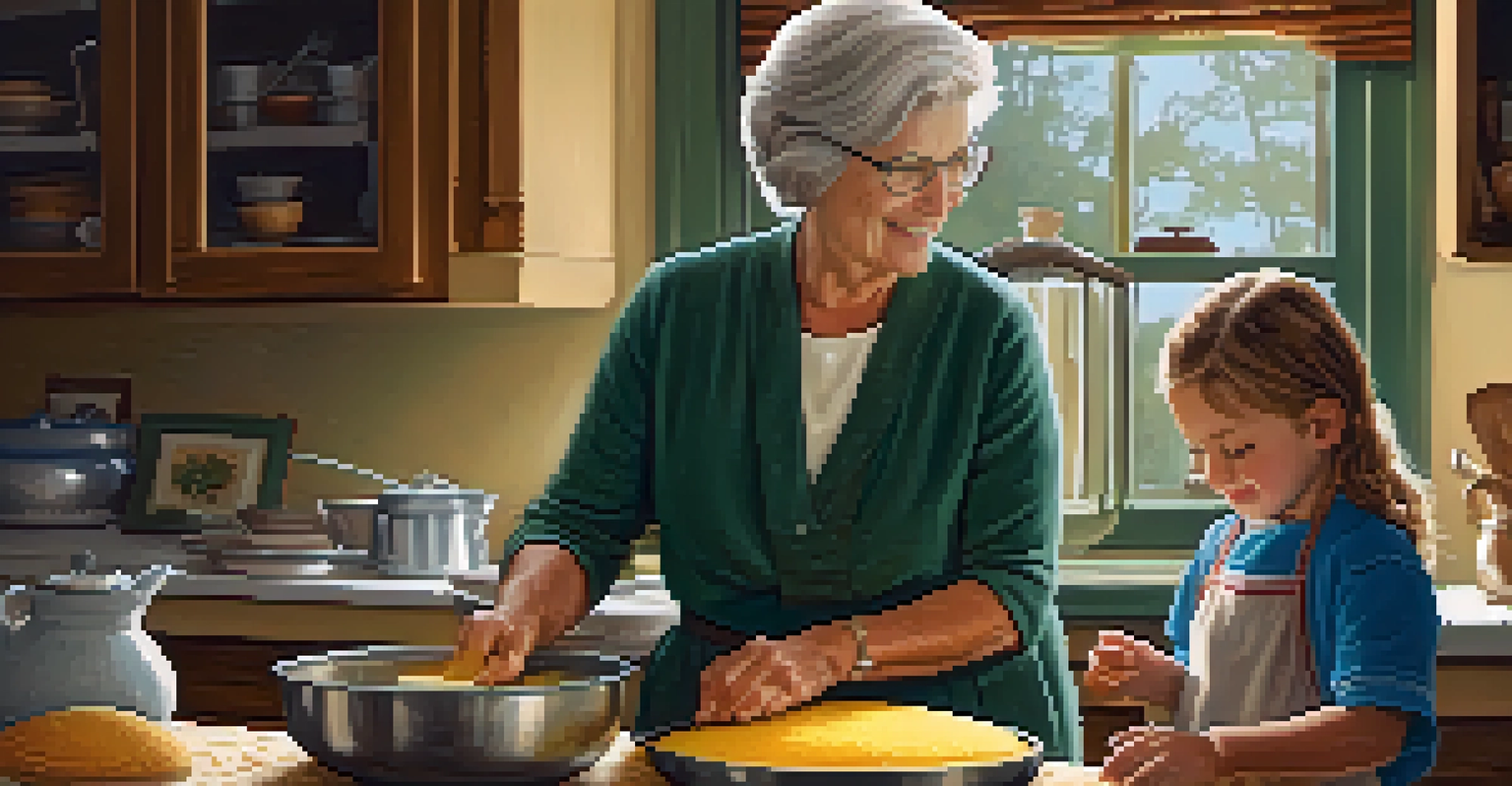The Fusion of Cultures in Southern Culinary Heritage

The Roots of Southern Cuisine: A Cultural Melting Pot
Southern cuisine is a rich tapestry woven from various cultural influences. African, Native American, and European traditions all contribute to the foods we love today. Each group brought unique ingredients and cooking techniques, creating a culinary heritage that is both diverse and delicious.
Food is a central activity of humanity and one of the single most significant trademarks of a culture.
For instance, the use of okra and rice in dishes like gumbo showcases African roots, while the introduction of spices and baking techniques from European settlers adds depth to Southern flavors. This blend of cultures not only reflects the history of the region but also highlights the adaptability of its people.
As we explore Southern culinary heritage, it's clear that this fusion is not just about food; it's about storytelling. Each dish tells a story of survival, creativity, and community, connecting us to our past while still evolving in the present.
Key Ingredients: The Building Blocks of Southern Dishes
At the heart of Southern cooking are key ingredients that have been embraced and adapted over generations. Staples like corn, beans, and rice have roots in various cultures, showcasing their versatility. These ingredients are often transformed into beloved dishes such as cornbread, jambalaya, and collard greens.

Take, for example, the humble cornmeal. Originally brought over by Native Americans, it has become a quintessential element in Southern cuisine, used in everything from fried catfish to hushpuppies. This ingredient's journey illustrates how regional agriculture and indigenous practices shaped culinary choices.
Cultural Fusion Shapes Southern Cuisine
Southern cuisine is a rich blend of African, Native American, and European influences, creating a diverse culinary heritage.
Moreover, the Southern kitchen is never without its spices. They provide depth and warmth to dishes, reflecting the influence of African culinary traditions. The result is a flavor profile that is bold and distinctive, a testament to the region's rich cultural heritage.
Traditional Techniques: Cooking Methods Across Cultures
Southern cooking is characterized by a variety of techniques that have been passed down through generations. From frying and smoking to slow-cooking and pickling, these methods reveal the resourcefulness of Southern cooks. Each technique reflects a cultural significance, often tied to available resources and the need for preservation.
Cooking is about creating a story, and every dish tells a story about who we are.
For instance, the art of smoking meats can be traced back to Indigenous practices, while frying came from African cooking traditions. These methods not only enhance flavor but also contribute to the overall experience of Southern meals, emphasizing the communal aspect of dining.
As families gather around the table to enjoy these lovingly prepared dishes, they are participating in a tradition that honors their ancestors. This connection through cooking techniques illustrates how Southern cuisine serves as a bridge between the past and present.
Celebrating Festivals: Food as a Cultural Expression
Food festivals across the South serve as vibrant celebrations of culinary heritage. Events like the New Orleans Jazz & Heritage Festival highlight the region's diverse culinary landscape, showcasing everything from crawfish étouffée to beignets. These festivals not only draw locals but also attract food lovers from all over the world.
During these gatherings, you can see how food acts as a cultural expression, bringing people together to celebrate their shared history. Culinary traditions are often showcased through cooking demonstrations, tastings, and cultural performances, enhancing the overall experience.
Family Recipes Preserve Tradition
Cherished family recipes passed down through generations connect families to their history and reinforce culinary traditions.
Festivals also offer a platform for local chefs and home cooks to share their unique interpretations of classic Southern dishes. This exchange of ideas and flavors fosters creativity and innovation, ensuring that Southern cuisine continues to evolve while honoring its roots.
Modern Influences: Reinventing Southern Classics
In recent years, Southern cuisine has experienced a renaissance, with chefs reimagining traditional dishes through contemporary lenses. The fusion of global flavors and techniques into Southern cooking is creating exciting new culinary experiences. For example, Asian flavors are increasingly being incorporated into classic Southern recipes, resulting in dishes like kimchi collard greens.
This modern twist on Southern classics not only reflects the region's growing diversity but also highlights the creativity of today's chefs. They are not afraid to experiment, blending ingredients and techniques to create something entirely new, all while paying homage to the traditional roots.
As we savor these innovative dishes, we witness the evolution of Southern cuisine. This ongoing transformation demonstrates how food can adapt to changing tastes and cultural influences, ensuring that Southern culinary heritage remains relevant and exciting.
Preserving Tradition: The Role of Family Recipes
Family recipes play a pivotal role in preserving Southern culinary heritage. Passed down through generations, these cherished recipes often hold deep sentimental value, connecting families to their history. Each recipe tells a story, reflecting the traditions and flavors that have shaped their culinary identity.
For many families, cooking together fosters a sense of community and belonging. Whether it's a grandmother teaching her grandchild how to make biscuits or a family gathering for a potluck, these moments reinforce the importance of culinary traditions. It is during these gatherings that the stories behind the recipes come to life.
Modern Chefs Reinvent Classic Dishes
Today's chefs are reimagining traditional Southern dishes by incorporating global flavors and techniques, ensuring the cuisine evolves.
Furthermore, many chefs are now seeking inspiration from their family recipes, blending them with modern culinary techniques. This practice not only honors their heritage but also ensures that these recipes remain alive and relevant in today's food landscape.
The Future of Southern Cuisine: A Cultural Journey Ahead
As we look to the future, Southern cuisine will continue to evolve, shaped by the dynamic interplay of cultures. With the influx of new culinary influences and a growing appreciation for diverse flavors, Southern cooking is more vibrant than ever. Chefs and home cooks alike are embracing this cultural exchange, leading to exciting culinary innovations.
The rise of farm-to-table movements and sustainable practices also reflect a commitment to honoring local ingredients. This focus on fresh, seasonal produce not only enhances the flavors of Southern dishes but also supports local farmers and communities.

Ultimately, the future of Southern cuisine lies in its ability to adapt and thrive while remaining deeply rooted in its history. As new generations embrace this rich culinary heritage, the journey of fusion, creativity, and connection will continue to flourish.